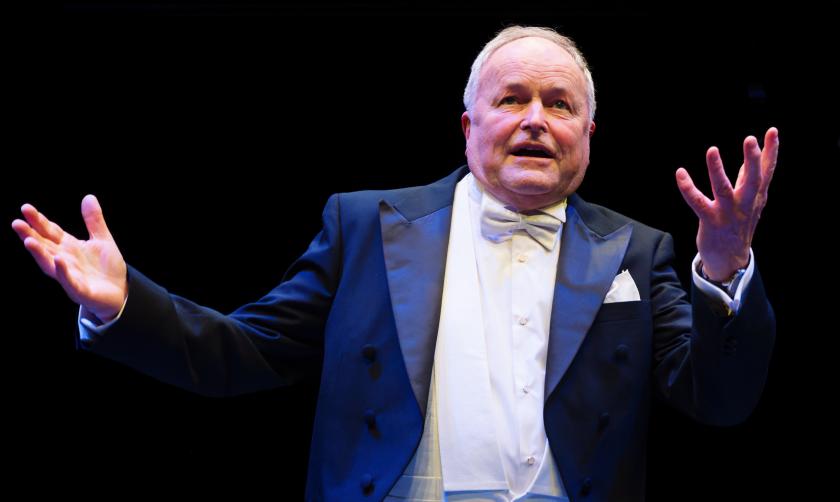Who better to write a piece about the game-playing of a peace-talks negotiation than a former peace-talk negotiator, Daniel Taub? And who better to sprinkle some comedy oofle dust on the proceedings than the TV producer and writer Dan Patterson, begetter of Whose Line Is It Anyway?, Mock the Week and many collaborations with Clive Anderson?
And a tail-coated Anderson is our narrator-come-game show host for Winner's Curse, whose ambitions ever so slightly overreach themselves. The premise is that Anderson is Hugo Leitski, a former, yes, peace-talks negotiator for a fictitious Eastern European country, Karvistan, which several decades before was at war with neighbouring Moldonia over territory surrounding a mine. Now, from the privileged perspective of old age, he is giving a Nobel Peace Prize lecture about these talks, to expose the feints and deceits that fuelled them. As the landlady of the Black Lagoon Lodge (Nichola McAuliffe), the venue for the talks, asks on his arrival, establishing which side he represents: “Liars or blackmailers?”
The young Leitski (Arthur Conti, pictured below) is a hapless first-time negotiator, nicknamed "Lightweight", who is there because his uncle is the Karvistani president. He has Harvard training in reconciliation studies, all buzzwords and pseudo-science. Tutoring him in the darker arts of peace talks is the older, amusingly sardonic Korsakov (Michael Maloney), leader of the Karvistani team, who provides much of the satirical ballast of the piece. Across the table from them are Moldonia’s General Gromski (Barrie Rutter), a bruiser with a reputation for sadism who can crack walnuts with one hand, and his assistant Rozhina (Winnie Arhin), who can’t.
 Anderson sets up the scenes from the past for us, then reveals the dirty tricks being played and the psychological processes being tweaked, from suddenly siding with the opposition to making them sit with the sun in their eyes. One key negotiating rubric, he advises, is that it isn’t what’s on the table that matters, but who is presenting it. To demonstrate this point, he gets the audience to pair up and do a deal with each other: there are 200 pvlotniks available, we are told, and one player has to offer the other a figure somewhere in that region, which the other can either accept or decline. Blissfully for Anderson, a woman he questioned on press night admitted she had accepted an offer of a mere eight pvlotniks from the man next to her, “because I like him”.
Anderson sets up the scenes from the past for us, then reveals the dirty tricks being played and the psychological processes being tweaked, from suddenly siding with the opposition to making them sit with the sun in their eyes. One key negotiating rubric, he advises, is that it isn’t what’s on the table that matters, but who is presenting it. To demonstrate this point, he gets the audience to pair up and do a deal with each other: there are 200 pvlotniks available, we are told, and one player has to offer the other a figure somewhere in that region, which the other can either accept or decline. Blissfully for Anderson, a woman he questioned on press night admitted she had accepted an offer of a mere eight pvlotniks from the man next to her, “because I like him”.
Anderson is a fine musterer of audience participation, and the hilarity he can conjure up as we go through the stages of the game-playing onstage keeps things buoyant. As do Patterson’s comic touches, underpinned by some nifty directing by Jez Bond and his sound designer, Sophie Cotton, that nails the sight gags and physical comedy. In one line, Leitski and Korsakov stand on the small central revolve, wrangling over who has to carry the suitcases (young Leitski, of course), with their backs to the direction of travel. “Do you get the feeling we are not getting anywhere?”
The key to making this panto-like material work is perfect timing and a light touch, and these Arthur Conti has in bucketloads. His deadpan delivery and self-possession are impressive in one making his stage debut (he is a member of the National Youth Theatre). McAuliffe, deploying a thick Northumbrian accent, does her share of the heavy lifting, too, via a running gag about her dead husband’s old sayings that gets lewder as the evening goes on. She also has a running gag of walking across the stage with items from her hunting swag, some of it roadkill, dispensing Morecambe and Wise-like one-liners as she goes. The serious business of talking peace is being given a comedy workshop treatment.
Maloney is the dramatic heart of the piece, a glint in his eye and acid in his tongue: the Sir Humphrey steering this ship of political fools, but himself being puppeteered by his unseen president. As a bumptious American mediator (Greg Lockett) arrives at the stalled talks and the mood darkens, we sense a convincing desperation behind Maloney’s smooth facade that the game isn’t going to plan. We are left with the sombre message that history will remember the people round this table and the music they created – jazz-like when the process is working and the two sides are riffing off each other, much as comedy improvisers do.
Where the piece doesn’t gel is in setting out its weightier stall. The ins and outs of the war, the areas of territory being disputed, are so much chatter, not things we can understand clearly enough in one viewing to fathom what’s actually at stake. A crucial scene in which Leitski’s inexperience and vulnerable feelings lead him to undermine his side’s position is too quickly set up for us to understand what is happening. There is a map of the disputed territory on the table, usefully visible from the balcony, but not clearly limned out in the dialogue. I ended up taking home the comedy but not enough of the message.















Add comment